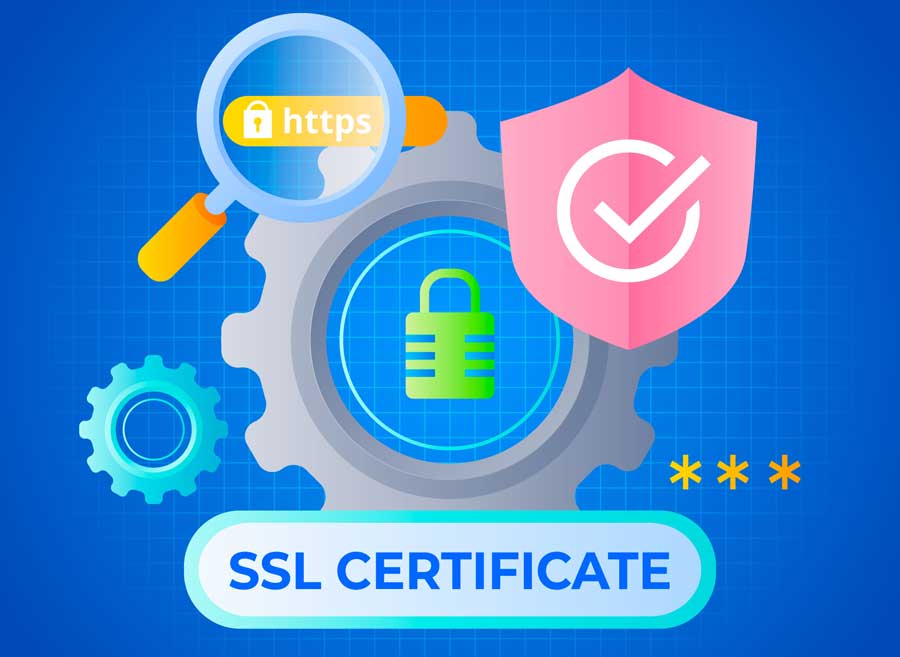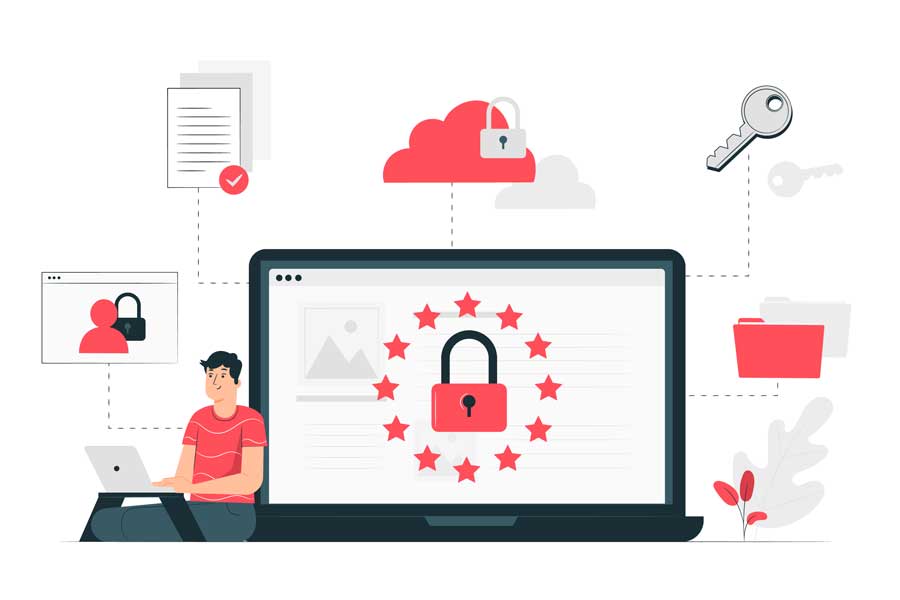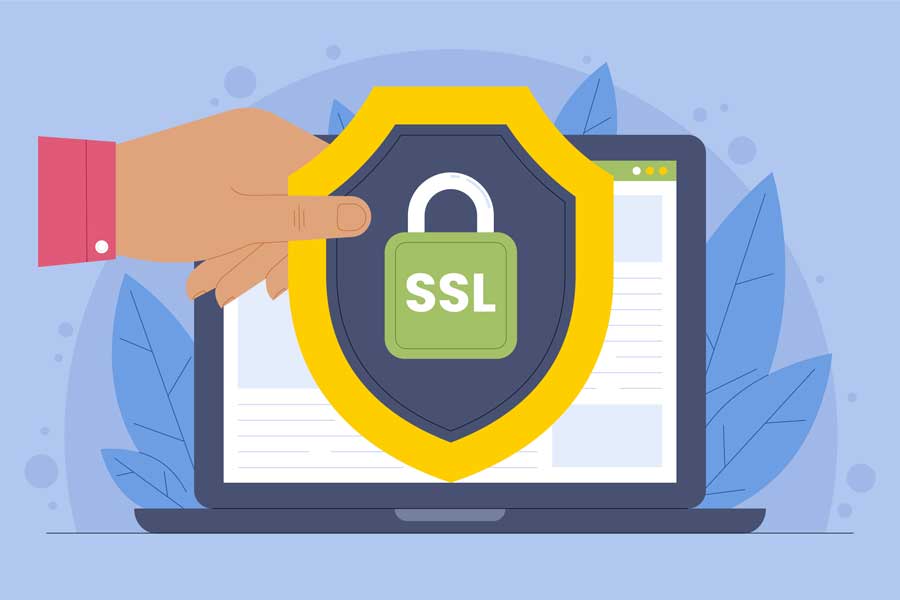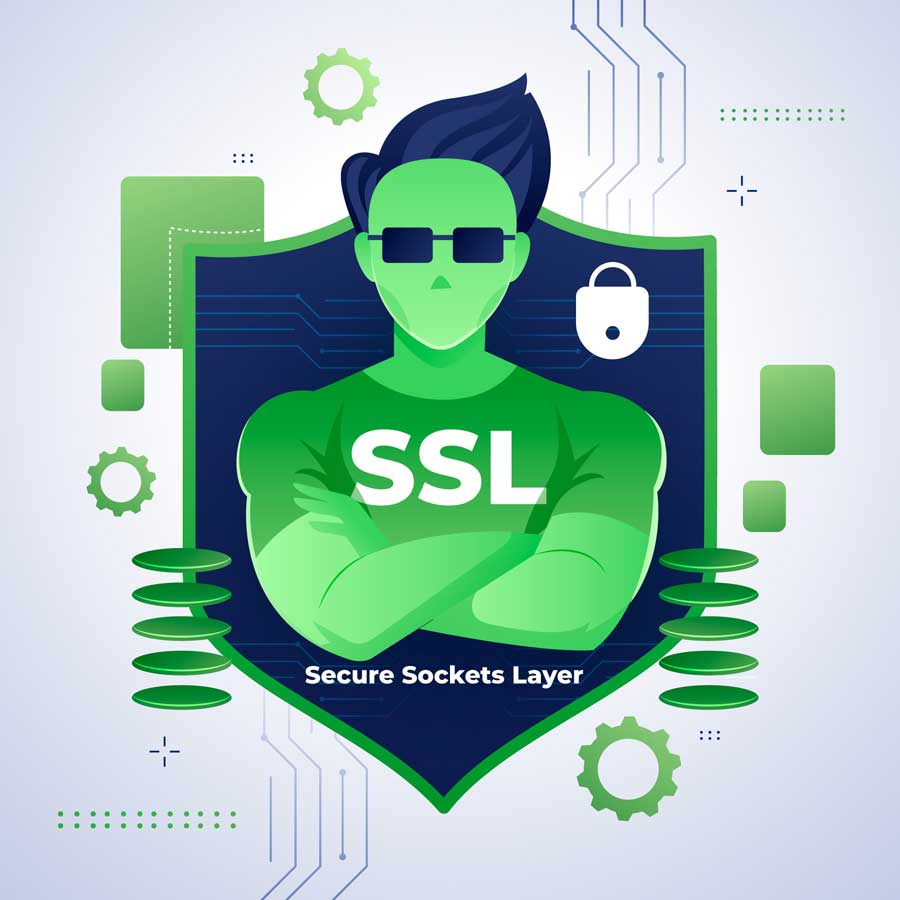Introduction
SSL (Secure Sockets Layer) Certificates are small data files that encrypt data packets sent between a server and a client or a browser. They’re designed to ensure safe internet browsing, protect confidential data and establish secure connections. In this article, we will delve into what SSL certificates are, how they work, their different types, and why they are essential.
What is an SSL Certificate?

SSL certificates are crucial for protecting sensitive information such as credit card numbers, usernames, passwords, email addresses, etc., as they are being transferred between computers and servers. They ensure that the information you send is read only by the server you intend to send it to.
When you send data over the internet, it doesn’t go directly to the recipient server. Instead, it passes through various computers to get to the final destination server. During these transitions, any computer in between you and the server can see and potentially tamper with your sensitive information if it is not encrypted with an SSL certificate.
How Does an SSL Certificate Work?

When a browser attempts to access a website secured with SSL, the browser and the web server establish an SSL handshake. This handshake involves the recognition of the SSL certificate and the creation of secure connectivity.
Here is a simplified version of the process:
- The browser connects to a website secured with SSL and requests the server to identify itself.
- The server sends a copy of its SSL certificate, including the server’s public key.
- The browser verifies the certificate with the certificate authority. If trusted, it creates, encrypts, and sends back a symmetric session key using the server’s public key.
- The server decrypts the session key using its private key and sends back an acknowledgment encrypted with the session key to start the encrypted session.
- Server and browser now encrypt all transmitted data with the session key.
This process ensures that the user and the server are the only parties that can decipher the transmitted data.
Types of SSL Certificates
SSL certificates come in various types to cater to different needs, these include:
What is a Domain Validation (DV) SSL Certificate?
Domain Validation (DV) SSL certificates provide a basic level of encryption and security for your website. They’re the simplest type of SSL certificate and are ideal for blogs, personal websites, or any site that doesn’t transmit sensitive information.
As the name suggests, the Certificate Authority (CA) only checks whether you have control over the domain for which you are requesting the certificate. They do not validate the organization behind the website or the identity of the individual requesting the certificate.
How to Get a DV SSL Certificate?
Choose a Certificate Authority: There are many Certificate Authorities available, each with their own costs and issuance times. Some popular choices include Let’s Encrypt (free but more technical), DigiCert, Comodo, and GlobalSign.
Generate a Certificate Signing Request (CSR): You’ll need to create a CSR on your web server. This is a block of encoded text that includes information such as your domain name and your server’s public key.
Apply for the Certificate: You’ll submit the CSR to your chosen Certificate Authority and apply for a DV SSL certificate. The CA will then send an email to the registered email address for your domain, which you’ll need to respond to in order to validate your domain control.
Install the Certificate: Once issued, you’ll install the SSL certificate on your server. The process for this varies depending on your server software. Your Certificate Authority should provide instructions to guide you through this.
Benefits of a DV SSL Certificate
Quick and Easy to Get: Because the validation process only involves checking domain control, DV SSL certificates can usually be issued within a few minutes to a few hours.
Cost-Effective: DV SSL certificates are generally the least expensive type of SSL certificate, making them a good choice for small websites or projects with a limited budget.
Provides Essential Security: Even though it’s a basic certificate, a DV SSL certificate still encrypts the connection between your website and your users, protecting against eavesdropping and tampering.
Limitations of a DV SSL Certificate
Limited Trust Indicators: DV SSL certificates only display a padlock in the address bar. They don’t show the organization’s name or details, as OV (Organization Validation) and EV (Extended Validation) SSL certificates do. This can make it harder to build trust with users, especially if you’re running a business or e-commerce site.
Not Suitable for Sensitive Data: If you’re handling sensitive information such as credit card details, personal information, or login credentials, you should consider using an OV or EV SSL certificate instead. These provide a higher level of trust and validation.
In conclusion, DV SSL certificates are a quick, easy, and cost-effective way to secure your website. While they might not offer the same level of trust or validation as OV or EV certificates, they’re an excellent choice for personal sites, blogs, or any website where the transmission of sensitive data is minimal.
What is an Organization Validation (OV) SSL Certificate?
An OV SSL certificate provides a moderate level of security and is suitable for public-facing websites that deal with less sensitive transactional data. Unlike DV SSL, where only domain ownership is verified, OV SSL certificates validate the organization behind the domain. This means the Certificate Authority (CA) verifies that there is a legitimate business operating behind the website.
How to Get an OV SSL Certificate?
Choose a Certificate Authority: There are numerous Certificate Authorities (CA) that issue OV SSL certificates. Some popular choices include GlobalSign, DigiCert, and Comodo.
Generate a Certificate Signing Request (CSR): You’ll need to generate a CSR on your web server. This will include important details such as your domain name and public key.
Apply for the Certificate: Once you’ve chosen a CA, you’ll submit the CSR to them and apply for an OV SSL certificate. As part of this process, you’ll be required to provide specific documents that prove your organization’s identity and location.
Complete the Validation Process: The CA will verify the details about your business. This process usually involves checking government databases, making a verification phone call, or other methods to confirm your business’s legitimacy.
Install the Certificate: Once issued, you’ll install the SSL certificate on your server. The process for this varies depending on your server software, but your CA will provide instructions to guide you.
Benefits of an OV SSL Certificate
Enhanced Trust: OV SSL certificates display the validated company name in the certificate details. This can increase trust among visitors and customers, as they can verify your business’s identity by checking the certificate.
Strong Encryption: Like all SSL certificates, OV certificates provide strong encryption, protecting data transmitted between the user and the server.
Limitations of an OV SSL Certificate
Not Instantly Issued: Unlike DV certificates, OV certificates require a validation process that typically takes a few days to complete.
More Expensive: OV certificates are more costly than DV certificates because of the extra validation steps involved.
Doesn’t Display Business Name in the Address Bar: While OV certificates verify your business’s identity, they do not display your business name in the address bar, unlike EV certificates. The only visual indication that a site uses an OV certificate is the padlock icon, which is also present for DV certificates.
In summary, OV SSL certificates are a step up from DV certificates in terms of the level of trust and validation they provide. They are a good choice for businesses that handle less sensitive information, and can help increase user trust and confidence in your website. However, for sites handling highly sensitive transactions, such as banks or online stores, an EV SSL certificate might be a better choice.
What is an Extended Validation (EV) SSL Certificate?
Extended Validation (EV) SSL certificates provide the highest level of assurance to your visitors and customers by showing that a trusted third party (the Certificate Authority) has thoroughly vetted your business. This type of SSL certificate is the most expensive and requires the most rigorous verification process, but it also offers the highest level of trust to your website’s users.
How to Get an EV SSL Certificate?
Choose a Certificate Authority: There are many Certificate Authorities (CAs) that offer EV SSL certificates. Some popular choices include DigiCert, Comodo, and GlobalSign.
Generate a Certificate Signing Request (CSR): You’ll need to generate a CSR on your web server. This includes information like your domain name and your server’s public key.
Apply for the Certificate: You’ll submit the CSR to the CA and apply for an EV SSL certificate. You’ll need to provide detailed information about your business, as well as supporting documentation to prove your business’s legitimacy and legal existence.
Complete the Validation Process: The CA will verify the authenticity and legitimacy of your business. They will check your business registration, verify your physical and operational existence, and confirm that you have exclusive rights to use the domain specified in the certificate.
Install the Certificate: Once issued, you’ll install the SSL certificate on your server. The process for this varies depending on your server software, but your CA will provide instructions to help you through it.
Benefits of an EV SSL Certificate
Highest Level of Trust: EV SSL certificates provide the highest level of user trust. They display your business name in the address bar, showing users that your business has been thoroughly vetted.
Strong Encryption: Like all SSL certificates, EV SSL certificates provide strong encryption for data transmitted between the user and the server.
Limitations of an EV SSL Certificate
Long Validation Process: The process to get an EV SSL certificate is the longest among the SSL certificates because it requires thorough business verification.
Most Expensive: EV SSL certificates are the most expensive due to the rigorous validation process.
Despite the longer validation process and higher cost, EV SSL certificates are a great choice for businesses that handle sensitive transactions. They provide a high level of assurance to users and can boost your site’s credibility and trustworthiness.

Why are SSL Certificates Important?

Data Encryption: At its core, data encryption is like a secret code. If you’ve ever used a secret language or decoder ring, you’ve used encryption. When data is encrypted, it’s transformed into a format that can only be read with a key. For SSL certificates, this key is a complex piece of cryptographic data that is unique for each session. When you connect to a site with an SSL certificate, your browser and the server establish this key, which is then used to encrypt and decrypt the data sent between them. This ensures that even if the data is intercepted, it cannot be read without the key.
Authentication and Verification: Imagine sending a letter through the mail. You’d want to be sure it’s going to the right place, right? SSL certificates work similarly for your data. When your browser connects to a site, the SSL certificate serves as a ‘passport’ that the site has to show to prove its identity. This ‘passport’ is issued by a trusted third party, known as a Certificate Authority (CA). The CA verifies the website’s details before issuing the certificate. When your browser sees this ‘passport’, it knows the site is legitimate.
Trust and Brand Power: The signs of a secure SSL-protected website (like a padlock symbol or a green address bar) are like quality marks or badges that a site can proudly display. They tell users that the site values their security and has taken steps to protect their information. For businesses, these signs can increase user trust, improve brand perception, and even boost sales. Research has shown that users are more likely to abandon transactions or avoid sharing personal information on sites that don’t have these security indicators.
Improved Search Engine Ranking: Search engines, like Google, aim to provide users with the most relevant and high-quality results. One measure of quality is site security. Google has confirmed that it gives a ranking boost to sites secured with SSL certificates, which means your site could appear higher in search results, potentially leading to more site visits.
Compliance: If you’re running an online store, handling card payments, or dealing with health information, you have to follow certain regulations and standards. For example, the Payment Card Industry Data Security Standard (PCI DSS) applies to any site handling card payments. One of the key requirements of the PCI DSS is that cardholder data must be transmitted securely. Using an SSL certificate is an essential part of meeting this requirement. Similarly, other regulations, like HIPAA for health information, also require data to be securely transmitted, which can be achieved with an SSL certificate. So, in simple terms, SSL certificates are like a superhero for your website. They protect sensitive information (their superpower), prove your site’s identity (their secret identity), display their badge (the padlock or green bar), improve your site’s reputation (public image), and help you follow the rules (the superhero code).
Questions and Answers about SSL Certificates.

- Q: What does SSL stand for?
Ans: SSL stands for Secure Sockets Layer. It’s a protocol that encrypts the data being transferred between a web server and a browser, or between two servers. - Q: How do I know if a site has an SSL certificate?
Ans: When you visit a site with an SSL certificate, you’ll see ‘https://’ at the start of the web address, instead of ‘http://’. You should also see a padlock symbol next to the URL in your browser’s address bar. - Q: Why do some websites have a green bar in the URL?
Ans: The green bar indicates that the website has an Extended Validation (EV) SSL Certificate. This means they’ve undergone a thorough validation process, providing a higher level of trust. - Q: Is it safe to input my personal information into a website without an SSL certificate?
Ans: Generally, it’s not recommended. Without an SSL certificate, data is not encrypted and can be intercepted by third parties. Always ensure that the website you’re providing sensitive information to has a valid SSL certificate. - Q: Can a website with an SSL certificate still be dangerous?
Ans: While an SSL certificate guarantees data transmission is encrypted, it doesn’t necessarily mean the website itself is safe or trustworthy. Always be cautious of phishing sites that mimic trusted brands, even if they have an SSL certificate. - Q: Does every website need an SSL certificate?
Ans: Technically, every website doesn’t need an SSL certificate. However, if a website is collecting sensitive information, processing transactions, or dealing with user logins, it’s crucial to have one. Also, having an SSL certificate can improve search engine ranking and boost user trust. - Q: How do I get an SSL certificate for my website?
Ans: You can get an SSL certificate from a Certificate Authority (CA). There are many CAs to choose from, with different types of certificates, validation levels, and prices. Once you’ve chosen a CA, you’ll need to apply for the certificate, validate your website and your business if needed, then install the certificate on your server. - Q: Does an SSL certificate affect website performance?
Ans: The encryption process can add minor latency, but with modern servers and SSL technologies, it’s usually negligible. The security benefits of SSL far outweigh this small performance consideration. - Q: Can an SSL certificate expire?
Ans: Yes, SSL certificates do expire. Most certificates need to be renewed annually, although some providers offer longer terms. It’s important to renew your SSL certificate before it expires to avoid interruptions in service or security issues. - Q: What happens if my SSL certificate expires?
Ans: If your SSL certificate expires, the secure connection between your server and users’ browsers will no longer be valid. Visitors will receive a warning message in their browser about the site’s security, which can deter them from visiting your site and damage your reputation. - Q: What is the difference between SSL and TLS?
Ans: SSL and TLS (Transport Layer Security) are both cryptographic protocols that provide data encryption for communications over networks. TLS is the successor to SSL and is generally considered more secure due to its updated encryption methods. However, the term SSL is still often used when referring to these security certificates. - Q: Can SSL certificates be transferred from one server to another?
Ans: Yes, SSL certificates can be transferred or moved from one server to another. This usually involves exporting the certificate (along with its private key) from the first server and importing it into the new one. - Q: What is a wildcard SSL certificate?
Ans: A wildcard SSL certificate secures a domain and an unlimited number of its subdomains. For example, a wildcard certificate for ‘*.example.com’ would secure ‘example.com’, ‘login.example.com’, ‘mail.example.com’, and so on. - Q: What is a multi-domain SSL certificate?
Ans: A multi-domain SSL certificate, also known as a SAN (Subject Alternative Name) certificate, allows you to secure multiple domain names with a single certificate. This can be a cost-effective and manageable solution if you operate multiple websites. - Q: Can I create my own SSL certificate?
Ans: Yes, it’s technically possible to create a self-signed SSL certificate. However, it won’t be trusted by web browsers and will generate warning messages to users. It’s advisable for testing purposes but not recommended for public-facing websites. For these, you should use an SSL certificate issued by a trusted Certificate Authority.
Remember, having an SSL certificate not only assures your website visitors of their data security, but it also enhances the credibility and trustworthiness of your website. Whether you are running an e-commerce platform, a blog, or a business website, SSL should be a key part of your security strategy. - Q: What’s the process of renewing an SSL certificate?
Ans: Renewing an SSL certificate is similar to the initial issuance process. You will need to generate a new CSR (Certificate Signing Request) from your server, submit it to the Certificate Authority, and then validate your domain ownership again. Once issued, you’ll need to install the new certificate on your server. - Q: Are SSL certificates platform-specific?
Ans: No, SSL certificates are not platform-specific. They can be used with any server or platform, as long as it supports SSL/TLS. This includes web servers, mail servers, FTP servers, and more. - Q: What is an intermediate certificate?
Ans: An intermediate certificate acts as a link between a website’s SSL certificate and the Certificate Authority’s root certificate. It’s used to enhance the security of the SSL certificate by keeping the root certificate offline and less susceptible to attacks. - Q: What does SSL certificate chain mean?
Ans: The SSL certificate chain refers to the sequence of trust from your SSL certificate to the root certificate. The chain usually includes your SSL certificate, one or more intermediate certificates, and the root certificate. Each element in the chain validates the one before it. - Q: Can I have multiple SSL certificates for one domain?
Ans: Yes, you can technically have multiple SSL certificates for one domain, for instance, when you need to use different types of certificates (like DV, OV, or EV) or have certificates from different Certificate Authorities. However, only one SSL certificate can be installed and active on an IP address-port combination at a time. - Q: What should I do if my browser says “SSL certificate is not trusted”?
Ans: If you encounter this error, it may mean that the certificate is self-signed, the Certificate Authority is not recognized, or the certificate has expired. If it’s a site you trust, you may proceed, but understand the risks. If you’re a website owner, you should get a certificate from a trusted CA or ensure your current certificate is up to date. - Q: What is SSL certificate pinning?
Ans: Certificate pinning is a security measure where a specific public key or certificate is associated with a particular server. Even if the certificate changes (such as during renewal), the pinned key remains the same. This helps prevent man-in-the-middle attacks using compromised or fraudulent certificates.
Understanding SSL certificates is vital for anyone running a website or dealing with sensitive data over the internet. Implementing them correctly can protect your data, build trust with your users, and even improve your website’s search engine ranking.











